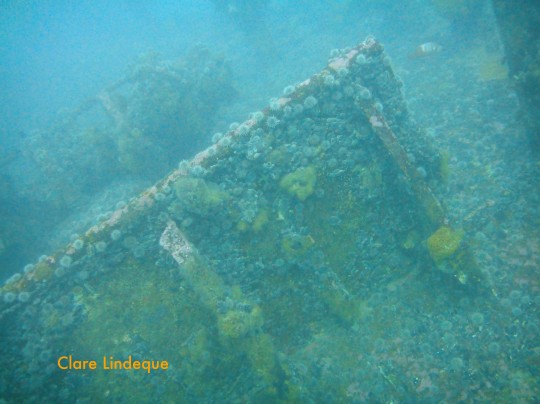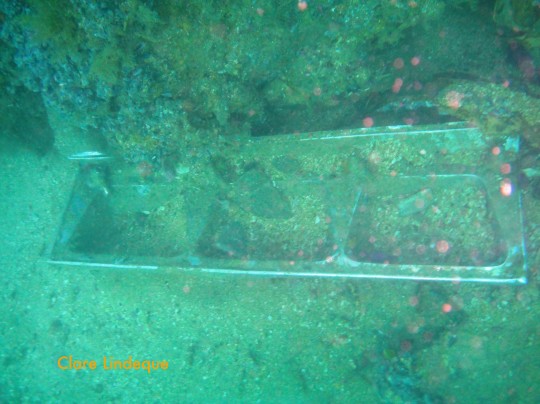
I’ve dived the SAS Pietermaritzburg once before, as part of the Wreck Specialty course I did along with Tami and Kate. The water then was distinctly green, and I was armed with a slate trying to draw a plan of the vessel. My other hand was trying to take photographs of nudibranchs. I didn’t perform either task particularly well.
Tony and I dived the Pietermaritzburg again on 9 July, as part of the OMSAC Treasure Hunt. We were on the Dive Action boat, and they dropped anchor on the wreck so the boat was over us throughout the dive. While I’m not sure about dropping shotlines and anchoring directly on wrecks, it’s universally practiced in Cape Town and does give a sense of security when one surfaces (assuming you’ve managed to stay on the dive site!).

The Pietermaritzburg was scuttled in 1994. She’s an old minesweeper, and actually participated in the D-Day invasion of Normandy as the lead minesweeping vessel. Having this little piece of history right in False Bay is quite awe-inspiring, particularly to someone like me who gets quite weepy (literally) if you mention the war. She was sold to the SA Navy in 1947, and was used as a training vessel and minesweeper until the mid-1960’s.

Located a very short distance (less than 1 kilometre) from the slipway at Miller’s Point, the SAS Pietermaritzburg is in quite an exposed position in the bay and as a result looks as bad or worse than the Smitswinkel Bay wrecks. The vessel is resting on its keel with a very pronounced tilt to one side (it was originally sitting upright, but storm damage has caused large portions of the vessel to collapse). The decks have mostly buckled and tilted, making for some vertiginous angles and possible head-bumping scenarios for the unwary photographer (i.e. me). The wreck used to be suitable for penetration, but it’s far too unstable and fallen in on itself now.

The hawse-holes are clearly visible, as well as several hatches. Tony found a toilet, and I located three very respectable looking kitchen sinks. Some kind of pressure vessel (looks like a boiler, but I don’t think it is and for once Tony isn’t sure either!) pushed up through the deck when the decking subsided. There’s also a very large anchor winch on the foredeck which is a cool shape – I kept coming back to look at it.


Last time I dived this wreck I was knee deep in gas-flame nudibranchs; this time I saw only one, but spotted a large number of shy little klipfish, curled up unobtrusively among the encrustations on the wreck (lots and lots of urchins and sea cucumbers). Tony found three cuttlefish, all napping together – what beautiful creatures! There are some interesting bits of the wreck that have fallen off onto the sand on the port side, and I found these to be more colourful than much of the rest of the vessel.

Visibility on this site is rarely much to write home about because of its exposed position, and we were extremely fortunate to have about 10 metres horizontal visiblity when we dived it – even after a week of southeasterly breezes.

Dive date: 9 July 2011
Air temperature: 21 degrees
Water temperature: 14 degrees
Maximum depth: 21.2 metres
Visibility: 10 metres
Dive duration: 43 minutes




































Comments are closed.